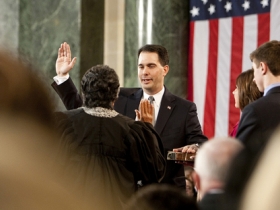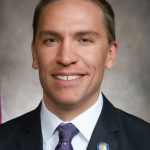Walker Says Campaign Cash Corrupts
At least if it comes from unions. As to other reforms in campaign finance, he's elusive.
Don’t get him started.
Wisconsin Gov. Scott Walker, asked if he thinks politicians including himself are as susceptible to the corrupting influence of money as the labor unions he bashes in his new book, has plenty to say — about the labor unions.
“Whether it’s a Democrat or Republican, in so many of these cases, folks have a freedom to associate, they have a freedom to choose,” Walker told the Wisconsin Center for Investigative Journalism in a recent interview. “What I fought about with public employee unions is they didn’t have that freedom.”
Before the changes he pushed through, state and local public workers had no choice but to contribute to their unions. “You have money that was forcibly taken from people without them having any say about that,” Walker said. “That’s where I thought the corruption was.”
The book, “Unintimated: A Governor’s Story and a Nation’s Challenge,” is fervent in its denunciation of money as the unions’ master.
Yikes.
Yet on the cusp of what may be a hugely expensive 2014 governor’s race, Walker sidestepped the question of whether politicians who need to raise large sums might also be led astray.
Arguably, the will to please big-money donors led to two of Walker’s greatest missteps — his comments to businesswoman Diane Hendricks about his plan to “divide and conquer” public employee unions, and his embarrassing remarks to a prankster pretending to be billionaire industrialist David Koch. But he didn’t want to go there.
Walker was more forthcoming in addressing why, in the lead-up to his 2012 recall election and afterward, through the last reporting in mid-2013, the majority of his campaign contributions came from people in other states.
“It was people here and across the country who looked at the protest, who looked at the recall, who thought it was an abuse of power, who went out of their way to say, ‘You know what? I’m going to send $25 or $30 or $40 to help someone out.’ ” He added that these out-of-state donors “don’t have any skin in the game. There wasn’t anything they wanted or desired out here.”
Of course, much of Walker’s total receipts have come from big-money donors, some of whom are cheering his agenda on unions, school choice and other issues. But the governor’s spin on these donations is politically astute.
Walker was noncommittal about a bill that passed the state Assembly and awaits action in the Senate that would, as amended, double the maximum individual contribution to candidates for state office, including governor.
“I haven’t advocated for it,” he said.
He made the same point about a bill to eliminate the requirement that candidates disclose their major donors’ principal place of employment. In the past, Walker has championed campaign disclosure: “The more transparency involved, the more people could hold folks accountable.”
He may still feel that way, but passed up a chance to criticize a bill that would seriously undermine donor transparency in Wisconsin.
Finally, while Walker said his book has gone into a third printing, apparently nothing has been done to correct admitted mistakes, noted in this column. (Walker’s spokesman and the book’s publisher did not respond to requests for comment.)
In one case, the spending on recall races by Senate Republicans and their supporters is vastly understated. In another, the book says “Democrats and their union allies” spent a huge sum against a GOP state senator, when in fact the figure cited represented spending by both sides, led by the senator and her supporters.
An error left uncorrected after it is pointed out is no longer an error.
Bill Lueders is the Money and Politics Project director at the Wisconsin Center for Investigative Journalism (www.WisconsinWatch.org). The project, a partnership of the Center and MapLight, is supported by The Joyce Foundation.
The Center collaborates with Wisconsin Public Radio, Wisconsin Public Television, other news media and the UW-Madison School of Journalism and Mass Communication. All works created, published, posted or disseminated by the Center do not necessarily reflect the views or opinions of UW-Madison or any of its affiliates.























“Before the changes he pushed through, state and local public workers had no choice but to contribute to their unions. “You have money that was forcibly taken from people without them having any say about that,” Walker said. “That’s where I thought the corruption was.””
This is a false statement. Federal law requires that there is an opt out for people that don’t want to be in the union.